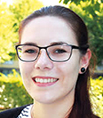(https://doi.org/10.55612/s-5002-044)

Ana Margarida Almeida
is an Assistant Professor at the University of Aveiro, Portugal. She is graduated in New Communication Technologies, holds a PhD in Communication Sciences and Technologies (University of Aveiro, Portugal) and lectures in the following undergraduate, graduate and doctoral courses offered by the Department of Communication and Art: BSc in New Communication Technologies, Master in Multimedia in Communication, Doctoral Program on Information and Communication in Digital Platforms, and Doctoral Program on Multimedia in Education. She has been developing research activities mainly related to “e-health and wellbeing”, “accessibility and digital inclusion’, “digital solutions for special needs”, “health promotion through ICT”, and “digital media development methodologies”. In 2016, she did a pos-doc study in the Faculty of Medicine (Department of Clinical Neurosciences and Mental Health) of the University of Porto, Portugal, in the area of e-health and, since then, she has been working to create the conditions to create a specific research group under this scope. She is now the coordinator of the Digimedia group ‘eHealth and Wellbeing’. She is a reviewer of several journals as well as of scientific events where she has been involved as a member of its Scientific Committees and as responsible for organizing special tracks. Author/co-author of over 200 scientific publications in these domains, she has been involved in national and international projects that explore digital media potential in supporting inclusion, communities of users with special needs and the promotion of healthier behaviours.

Wolmet Barendregt
has studied the use and design of (educational) technologies for children. She holds a PhD in Interaction Design and a Master in Computer Science. After working in the Division of Learning, Communication and IT, at the Department of Applied IT, University of Gothenburg for 12 years, she moved to Eindhoven University of Technology in The Netherlands in 2019 where she focused on ICT for sustainability while still being engaged with research on children’s interactions with technology. She has conducted research in projects such as EMOTE (Embodied perceptive tutors for empathy-based learning), START (Student Tutor and Robot Tutee), and VASE (Teaching Value-Sensitive Design in Higher Education) and has served on organizing committees and as editor for scientific conferences and journals (e.g., Interaction Design and Children, NordiCHI, International Journal of Child Computer Interaction, Sustainability, and Journal of Cleaner Production). As of September 2022, she will start working as a sustainability consultant outside academia.

Jordan Beck
is an assistant professor of user experience design at the Milwaukee School of Engineering (MSOE). Prior to his appointment at MSOE, he was an Assistant Research Professor at the College of Information Science and Technology at Penn State University. His research interests include knowledge production in design disciplines, and scholarly communication and the computational tools that shape and facilitate it.

John M. Carroll
is Distinguished Professor of Information Sciences and Technology and Director of the Center for Human-Computer Interaction at Pennsylvania State University. His research is in methods and theory in human-computer interaction, design of interactive information systems for collaborative learning and problem solving, and spontaneous innovations of people interacting with technology mediated problems and possibilities.Carroll has received the Rigo Award and the CHI Lifetime Achievement Award from ACM, the Silver Core Award from IFIP, and the Goldsmith Award from IEEE. He is a fellow of AAAS, ACM, IEEE, the Human Factors and Ergonomics Society, the Psychonomics Society, the Society for Technical Communication, and the Association for Psychological Science. In 2018, he received the Faculty Scholar Medal in Social and Behavioral Science from Penn State.

Sara Ekström
is a PhD candidate in informatics with specialization in work-integrated learning at University West, Sweden. She has a Master of Science in Engineering Physics and has previously worked as a high school teacher. Her research area is digital technology in education and she is currently interested in how social robots can be used to stimulate students´ learning but also how the robots affect the teacher’s role both in and outside the classroom.

Maka Eradze
has received her PhD degree specialised in Technology-Enhanced Learning (Tallinn University, Estonia). As a part of her PhD interdisciplinary research she has developed The Framework for Contextualised Multimodal Observations and designed a classroom observation application Observata that supports the collection of design-aware data for evidence based classroom practices. Currently, she is a research fellow at the University of Modena and Reggio Emilia in the field of technology-enhanced learning. In past she has worked in the University of Naples Federico II as a researcher. Her research interests include learning analytics, learning design, classroom observations, MOOCs and their on-campus use, evidence-based educational practices, educational transformation, and educational research methodologies and methods. She is an author of numerous scientific articles, reviewer for number of international peer-reviewed journals and a program board member of international conferences in the field of TEL. She has been involved in numerous European projects in technology enhanced learning, learning analytics, and MOOCs.

Ilker Erkan
completed his doctorate education in civil engineering. Then he started teaching full time at Suleyman Demirel University Faculty of Architecture. His areas of interest include computational design, neuro-cognitive sciences, architectural education, and human behavior. He is strictly interested in virtual reality systems EEG and eye-tracking technologies. Dr. Erkan shares his experiences in his graduate courses, and at many international conferences, he attended. Besides, computational design and production methods, artificial intelligence, and transportation systems are among his interests.

Sofia Frankenberg
is Associate Professor in Early Childhood Education at the Department of Child and Youth Studies at Stockholm University. Her work is based in a Relational Developmental Science perspective focusing child development and learning in pedagogical contexts.

Agneta Gulz
is a full Professor at Lund University Cognitive Science and director of the Educational Technology Group. The group contributes to the development of theories and technologies that inform basic research on human learning while also improving instruction and education in practical settings. The research is characterized by an orientation towards schools’ and preschools’ practices and daily activities together with the use of iterative processes of evaluation and re-design. Central themes include students’ engagement with critical, constructive feedback, students’ motivation and perseverance, and students’ self-efficacy in particular domains. One of the group’s line of research during the past years is how to support 11-13 year olds in developing data literacy

Magnus Haake
is Associate Professor at Lund University Cognitive Science. Haake, whose expertise lies in the intersection of design sciences, cognitive sciences, graphic design and engineering, is deputy director of the research group Educational Technology Group. The research and development carried out by the group has two purposes: (1) exploiting educational software as research instruments to explore learning and instruction, and (2) developing educational software with a real-world value. The two purposes are intertwined. The educational software is developed on the basis of empirical knowledge about human cognition. Evaluations and real-world use of the pedagogical software produces new insights and knowledge – which is then also fed back into the software as it is redesigned. One of the group’s lines of research during the past years has been how to support preschoolers as well as preschool teachers in the domain of early math.

Svea Kiesewetter
holds a Master of Education in Biology and English and a Master of Science in Information Technology and Learning. She currently works as a PhD student at the Division of Learning, Communication and IT, Department of Applied IT, University of Gothenburg and is part of the Graduate Research School at the Centre for Educational Sciences and Teacher Research. Her research focuses on Datafication processes and practices in educational contexts and on critical data literacies.

Susanne Kjällander
is Ph.D. in Didactics and senior lecturer at the Department of Child and Youth Studies at Stockholm University, Sweden. Her didactic research has a multimodal design theoretical approach and concerns students’ learning in digital learning environments in preschools and schools.

Mart Laanpere
is a senior researcher at Centre for Educational Technology, in Tallinn University, Estonia. He holds a Ph.D. degree in educational science (from Tallinn University) and MSc in Educational & Training Systems Design (University of Twente, the Netherlands). He was a founder and long-term director of the Centre for Educational Technology. His main focus in research is conceptual design and analysis of affordances of technology-enhanced learning systems and tools, assessment of digital competence of teachers and digital maturity of schools, instructional design, didactics of computing education. He is a member of the steering group of National Strategy for Lifelong Learning 2014-2020. Mart has contributed to development, piloting and implementation of European digital competence models DigComp, DigCompOrg and DigCompEdu.

Sooyeon Lee
is a PhD candidate in Information Sciences and Technology at The Pennsylvania State University working with Professor John M. Carroll and Professor Mary Beth Rosson at the center of Human-Computer Interaction (HCI). She received her B.S. in Information Sciences and Technology from The Pennsylvania State University. Her research interests are in HCI, accessibility, and human-centered AI. Her research focuses on designing and developing smart camera visual prosthetics and user interfaces for people with visual impairments. Currently she is working on her dissertation on the topic of effective and pleasant interactive dialog system for people with visual impairments.

Flavio Manganello
received the M.S. degree in communication sciences from the Università La Sapienza, Rome, Italy, in 2003 and the Ph.D. degree in ‘engineering science, e-learning curriculum’ from the Università Politecnica delle Marche, Ancona, Italy, in 2011. He is a Researcher at the Institute for Educational Technologies of the Italian National Research Council, Genova, Italy. His research interests include self-regulated learning, personalized learning, learning design, and quality in online learning.

Nikola Milikic
is a Software Engineer at Sysdig and a former Assistant Professor with the Department of Software Engineering, the University of Belgrade, Belgrade, Serbia. His research interests include technology-enhanced learning, machine learning, and learning analytics. He is a member of the GOOD OLD AI Research Network at the University of Belgrade.

Lena Pareto
is full professor in informatics with specialization in work-integrated learning at University West, Sweden. Her research area is digital technology and learning and her speciality is human-machine agency. Her research concerns digitalization in society and how innovative design of digital technology can enrich learning situations and stimulate learning, in education and in workplaces. Her research projects are often design-based, action oriented, cross-disciplinary and coproduced together with practitioners, using technology such as artificial intelligence, serious games, virtual reality or robotics.

Marcello Passarelli
is a PhD in Psychology, Anthropology, and Cognitive Sciences working in ITD-CNR as a research fellow since 2017. His research interests include implicit measures, statistical modeling, and social cognition, with a strong quantitative focus. During his stay in ITD-CNR, he worked on the H2020 Gaming Horizons project, focusing on the social impact of video games and gamification, on the Erasmus+ CODUR project for quality assurance of e-learning institutions, and on the Erasmus+ ENhANCE project, which designed a European curriculum for family and community nurses.

Luís Pedro
is an Assistant Professor at the Department of Communication and Arts, University of Aveiro, Portugal, where he lectures in Communication Sciences and Technologies undergraduate, graduate and doctoral courses. He is an integrated member of the DigiMedia research group and his research interests are related to social media development, integration and assessment in educational and training contexts, which have been developed in >40 MSc and 5 PhD supervisions and through the coordination and participation in externally funded research projects. He is (co-) author of 6 books in the topic of Multimedia Technologies for secondary level teaching and learning and has also (co-) authored over 50 scientific publications (journals/conference papers and book chapters) on subjects related with ICT, EdTech, Social Media, TEL and PLEs. He is a reviewer in national and international journals and he also serves as a Program Committee member for various national and international conferences in the referred scientific fields.

Donatella Persico
is research director at CNR-ITD. She has been active in the field of educational technology since 1981. Her major research interests include learning design, e-learning, self-regulated learning, teacher training, game-based learning and learning analytics. She was research fellow at Bradford and Exeter university, UK, Glasgow Caledonian Academy, UK, and at the Universidade de Santiago e Compostela, Spain. She has been involved in several teacher training programmes as a lecturer in educational technology. She is author of educational material and scientific publications of various kinds, including books, educational software, multimedia material and research papers concerning various aspects of educational technology. She is editor of the Italian Journal of Educational Technology and sits on the editorial board of international and national journals, on the PhD board in Philosophy and Educational Sciences of the Ca’ Foscari university of Venice and has a long standing experience in the management of national and international projects.

Fernando Ramos

Madison Reddie
is an undergraduate student in the Penn State College of Engineering and Schreyer Honors College working toward a B.S. in Mechanical Engineering with honors in Engineering Design. She also earned a certificate from the National University of Singapore’s Mechanical Engineering Product Design Programme in 2018. Her undergraduate research has included the study of assistive technology for the visually impaired in the Center for Human-Computer Interaction, the evaluation of human factors and ergonomic implications of designs in OPEN Design Lab, and an analysis of the usability of design tools in an undergraduate thesis.

Denis Renó
Journalist and photographer, CNPq researcher productivity fellow – Level 2, he is PhD in Communication by Methodist University of São Paulo (Brazil), whit postdoctoral research about interactive interfaces at University of Aveiro (Portugal) and postdoctoral research about transmedia journalism at Complutense University of Madrid (Spain). Currently, he is associate professor at São Paulo State University – UNESP (Brasil) and researcher at DigiMedia – Digital Media and Interaction Research Centre (University of Aveiro, Portugal). He is CNPq researcher productivity fellow – Level 2 and also a visiting professor at National University of Rosario (Argentina), Technical Particular University of Loja – UTPL (Ecuador) and honorific professor at Complutense University of Madrid (Spain). Finally, he is Scientific Director at Latin-American Cathedra transmedia and Director at GENEM – Research Group of New Media Ecology.

María Jesús Rodríguez-Triana
did her doctoral studies at the GSIC-EMIC group, receiving her PhD in Information and Communication Technologies from the University of Valladolid (Spain). In 2014, she joined the REACT group at the École Polytechnique Fédérale de Lausanne (Switzerland) as a postdoctoral fellow and, since 2016, she is a senior researcher at the Centre of Excellence in Educational Innovation of Tallinn University (Estonia). Since 2008, she has been involved in various educational research projects at the national and international level dealing with the application of learning analytics in physical and digital spaces (LLP – PREATY, EEE-WEB), to support decision making from classroom to institutional levels (H2020 WIDESPREAD – CEITER), and to reinforce different pedagogical approaches such as collaborative (LLP-METIS, SOFOCLES, RESET) or inquiry learning (GO-LAB, IMAILE, Next-Lab, GO-GA). Currently, she is investigating the challenges and strategies towards the adoption of learning analytics in authentic scenarios such as classrooms, institutions and communities of practice.

Mary Beth Rosson
is Professor-in-Charge of Human-Computer Interaction in the College of Information Sciences and Technology at the Pennsylvania State University. Prior to joining Penn State, she was Professor of Computer Science at Virginia Tech for 10 years, and a Research Staff Member at IBM T. J. Watson Research Center for 11 years. She is internationally known for work in human-computer interaction, scenario-based design, computer-supported collaborative learning, and end-user development. In recognition of her research accomplishments, Dr. Rosson is a Distinguished Scientist of the Association for Computing Machinery and a member of the SIGCHI Academy.

Sofia Serholt
studies the use of social robots in education with a particular focus on aspects of interaction, ethics and learning. She holds a PhD in Applied IT with specialization in Educational Sciences and a Master of Education in English and ICT and Learning. She currently works as Senior Lecturer at the Division of Learning, Communication and IT, Department of Applied IT, University of Gothenburg, where she is a member of Applied Robotics in Gothenburg: a research group that focuses on exploring human-centered approaches to robot design and social and ethical implications of robots in society. She has conducted research in projects such as EMOTE (Embodied perceptive tutors for empathy-based learning) and START (Student Tutor and Robot Tutee), and has served on organizing committees and as editor for scientific conferences and journals (e.g., British Journal of Educational Technology and Frontiers in Robotics and AI). She regularly engages in public and academic speaking at conferences and events, and her research on educational robots has received extensive coverage in Swedish and international press.

Paula Alexandra Silva
is a Human-Computer Interaction (HCI) lecturer, researcher, and practitioner whose passion is to understand how to leverage technology to create a better future for us all. She is also a passionate teacher who strives to create exceptional learning experiences for her students. Currently, she is an Assistant Professor at the Department of Computer Science, within the Faculty of Science and Technology of the University of Coimbra. Before she held appointments as lecturer at a number of universities, as Postdoc Fellow at the University of Hawai’i and as Senior Scientist at Fraunhofer Portugal, where she managed the Human-Computer Interaction area and group. She has earned her Ph.D. in Computer Science from the University of Lancaster, UK. Since finishing her PhD she focuses on designing applications for older adults with a view to improve their overall health and wellbeing and enable their active participation in society.

Kairit Tammets
is the head of Centre for Educational Technology (CET). She received a PhD in educational sciences in 2013 from the Tallinn University. Her research has been related with collaborative knowledge building and professional development at the workplace, especially in teacher education context. Her interest is also related with competency-based digital learning ecosystems for supporting workplace and informal learning. Recently Kairit has been contributing to the design and development learning analytics methodologies and tools in several local and international projects of CET.

Oksana Tymoshchuk
is graduated in Universal History and Practical Psychology, detains a Master in Educational Sciences/Special Education and holds a PhD in Multimedia in Education, University of Aveiro. Currently, she is a postgraduate researcher in the project CeNTER– Community-led Networks for Territorial Innovation (Centr-01-0145-FEDER-000002). Her present research interests are related to Territorial Innovation Systems, digital inclusion, media for all and communication technologies to support citizens with special needs.
